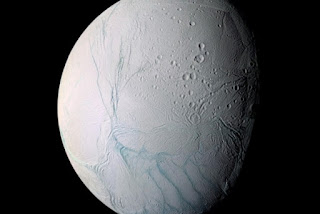 |
| Saturn's icy moon Enceladus is thought to host a liquid ocean beneath its frozen surface that could be hospitable to life. Credit: NASA |
Topics: Astrobiology, Astrophysics, Moon, NASA, Planetary Science, Space Exploration
Saturn’s frozen moon Enceladus is a tantalizing world—many scientists are increasingly convinced it may be the best place in our solar system to search for life. NASA’s Cassini spacecraft, currently orbiting Saturn, has made intriguing observations of icy jets spewing from a suspected underground liquid ocean on the mysterious world that might be hospitable to alien life.
Cassini’s tour is due to wind down in 2017, and scientists badly want to send a dedicated mission to Enceladus to look for signs of life. In fact, some have already started seriously thinking about exactly how they might do this—including planetary scientist Carolyn Porco, who is the imaging team leader for Cassini.
Although Enceladus is small in size and shrouded in a thick shell of ice, it appears to be a habitable world: It has a source of energy from friction created by its orbit around Saturn, organic compounds that are building blocks for life and a liquid water ocean underneath all that ice. But just because Enceladus may be hospitable to life does not mean life exists there; it will take much more work to definitively prove it. At the Berkeley meeting, scientists laid out the data Cassini has collected for Enceladus—they discussed analyses of its geysers, measurements of its ice shell, ideas on what its ocean chemistry might be like, and more. Yet even with all the newest data and models scientists have, they are not even close to detecting organisms on Enceladus—hence the need for a space mission.
Scientific American: Excitement Builds for the Possibility of Life on Enceladus
Annie Sneed
Comments